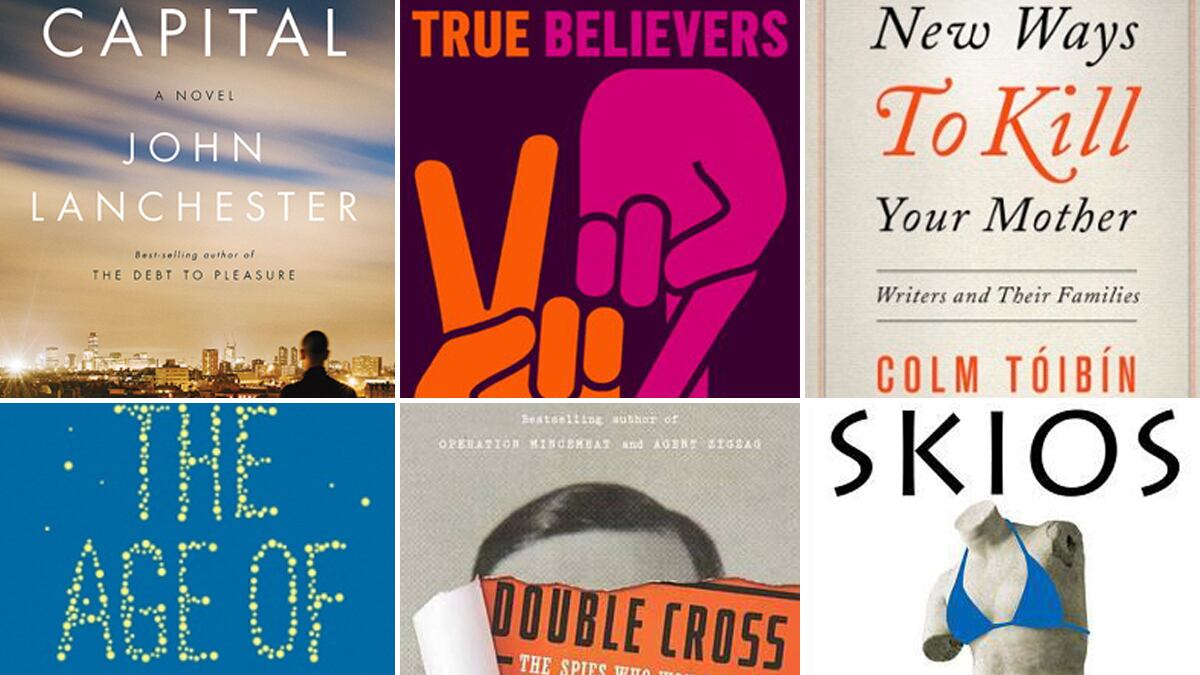
From an ambitiously mythical novel about a wedding off Cape Cod to the definitive biography of cooking crusader Julia Child, Jimmy So and Lucas Wittmann pick the best books of the tropical season.

Capital: A Novel by John Lanchester. June 11
Trollopian, Dickensian, Balzacian—all should spring to mind when you pick up John Lanchester’s hefty new novel about near present-day London. Set on a typical (and dear reader, atypical in having a writer as gifted as Lanchester tell its story) London street (Pepys Road), he weaves a rich story about the financial collapse and its impact on financier and graffiti artist alike. We’re all connected by capital.

Seating Arrangements: A Novel by Maggie Shipstead. June 12
“Literary thinking relies upon literary memory, and the drama of recognition,” Harold Bloom once wrote. Shipstead’s first novel can be read as an unremarkable Harvard-tinted, golf-club obsessed WASP comedy about a—what else—wedding on a—where else—Cape Cod island. But read past that and it’s clear Shipstead is coming to terms with T.S. Eliot (quoted in the epigraph), Shakespeare, Arthurian legends (chapters include “The Castle of the Maidens” and “The Maimed King”), and other mythologies (“A Centaur” and “The Ouroboros”), and connecting it to the American Camelot. (Even the title “Seating Arrangements” brings to mind the round table.) This is ambitious, but if you grew up in New England, how many times have you sat on your beach chair with The Once and Future King and a biography of JFK, purling these mythologies in your sunned head?

New Ways to Kill Your Mother by Colm Tóibín. June 12
No man is an island, not even deeply psychological writers who must spend night after night inside the interior of a mind. Through essays on Henry James (building on Tóibín’s own novel The Master), Yeats, Beckett, Thomas Mann, Hart Crane, James Baldwin, and even Barack Obama—yes, all men—Tóibín explores the spectacular ways anti-social men of literature screw up their relationships with their families.

The Red House: A Novel by Mark Haddon. June 12
There’s a red house over yonder, and just as Jimi Hendrix splintered and exploded the blues while remaining exciting and accessible, Haddon, the author of The Curious Incident of the Dog in the Night-Time, has the same tendency on narrative. So it is that the story of Richard, a doctor who invites his sister’s family to stay at his vacation home, is told through the perspectives of eight different people, with almost each paragraph beginning with “Daisy wants happiness…” “Melissa tries to ring…” “Benjamin was crying…” At its best, it resembles a game of “Clue.”

Mission to Paris by Alan Furst. June 12
One of life’s recurring pleasures is the publication with welcome regularity every two years or so of the latest atmospheric delight from Alan Furst. Over the course of about a dozen novels he’s imbued the already misty and treacherous streets of 1930s and '40s Europe with even greater menace and intrigue. His latest follows a Hollywood star turned spy around Paris as he is hunted by the Nazis and encounters German Baronesses, assassins, Russian actors, and more. Have your Homburg at the ready.

Mrs. Robinson’s Disgrace by Kate Summerscale. June 19
In 1858 Victorian England, an industrialist found his wife’s diary, read it, and filed for divorce against her. Lest we fail to associate this with a sex scandal, the man was conveniently named Henry Robinson, making the long-suffering wife Mrs. Robinson. Her most private thoughts, including her infatuation with the married Dr. Edward Lane, were read out loud in court, causing a sensation at the time. Did she actually have an affair? And will the divorce be granted?

Skios: A Novel by Michael Frayn. June 19
Novels like Steppenwolf and The Magus have always seemed just the cup of tea for the playwright of Copenhagen, Noises Off, and Democracy, with their unicycle balance of intellect and drama. Skios does remind one of a comedic version of John Fowles, set on a private Greek island (of the title) amid layers of illusions, as you try to find out whether Dr. Norman Wilfred is a young, handsome, charming man or a balding, pompous jerk.

The Age of Miracles: A Novel by Karen Thompson Walker. June 26
The rotation of the world begins to slow, and the end of days (at least, of 24-hour days) is written not only as the struggle for survival but also a terrible bummer when 11-year-old Julia tries to maintain her crush on hottie Seth Moreno. This debut novel might sound like a cross between The Lovely Bones and Lar von Trier’s film Melancholia, but the conceit is memorable and there are hilarious moments. “We were not required to squeeze our days into twenty-four little hours. No new law was passed or put into place. This was America.”

All We Know: Three Lives by Lisa Cohen. July 3
Modernism, in theory, had no limits. But what if you fail to attend those impossible heights? Can everyone be James Joyce? The question was particularly punishing for women, who had to overcome historical and societal constraints. This remarkable portrait of the “promising” writer Esther Murphy, the “friend” and lover to movie stars Mercedes de Acosta, and the British Vogue fashion editor Madge Garland shows just how complex it is to live quiet lives of mediocrity, and find meaning in compromise.

True Believers: A Novel by Kurt Andersen. July 10
“My publishers signed me up a year ago to write a book, but not this book,” so begins Andersen’s new novel, jabbing a finger in the rib of “postmodern” writers like Paul Auster, whose books often end in “Hey, guess what? That book I said I was writing is the one you’re reading!” Karen Hollander has removed herself from a Supreme Court nomination, and the reason is about to be revealed in her memoir, which details something she did as a radical in 1968. The title asks the reader to shun the myth of the “unreliable narrator,” and Andersen is earnest in his exploration of culture and politics in the 1960s and the 2010s.

The Impeachment of Abraham Lincoln: A Novel by Stephen L. Carter. July 10
This is the season for novels of revisionist premises, and Carter’s new novel asks: what if Lincoln survived his assassination? A young black woman hired by Lincoln’s impeachment defense lawyers investigates the twists and turns that led to the murder of the lead counsel, and there’s a lot to learn about law and politics in this unconventional thriller. Even the ending represents a small cliffhanger, dangling in front of us the uncertain and unknowable nature of both the past and the present.

Gold: A novel by Chris Cleave. July 10
Incendiary and the mega-million bestseller Little Bee depended on the driving force of plot, and Gold is the same. But the story of three friends eyeing their last chance at a gold medal in track cycling at the 2012 Olympics (and a daughter battling leukemia) is told like one long episode of Law and Order, with each scene prefaced by a date and setting, even including the hilariously imagined “Death Star, 1:55 p.m.” and “Dagobah System, 12:55 p.m.” alternating with the heartbreakingly real “Pediatric intensive care unit, North Manchester General Hospital, 12:35 p.m.” Cleave is at last completely aware of his reliance of contrived events and emotions, just like in a television drama, and there need not be any shame in it.

The Long Road to Antietam by Richard Slotkin. July 16
To understand the sheer tragedy of the bloodiest single-day battle of the Civil War, imagine the impossible: that the “military genius” Gen. George McClellan was not one of the greatest procrastinators of all time; that he was not insubordinate to President Lincoln; that he did not fantasize about a coup that would install himself as dictator; that he did not hesitate to take Richmond from Robert E. Lee. Suppose the nation had not flounder deeper and deeper into the bitter hatred of war. The immense wastefulness of McClellan’s conflict with Lincoln culminates in Antietam, where casualties numbered 23,000.

Why Does the World Exist? by Jim Holt. July 16
OK, we accept that a book about the puzzle of existence may not strike you as ideal beach reading. In fact, you might think us sadists for even suggesting it. But trust us, there is no more entertaining, sure-footed, and witty guide to the big questions that we must all ponder than Jim Holt. Join him.

The Twilight War by David Crist. July 19
The Iran-contra in the mid-1980s showed America at its most foolish, arrogant and hypocritical. The administration, at the coercion of the Israeli government, is once again engaged in a manipulative standoff with the Islamic Republic of Iran over its nuclear program. This conflict is not a Cold War, nor a War on Terror exactly. Yet it has played a huge role in American foreign policies for the past 30 years, and no doubt will continue to do so. Crist’s history is required reading.

Broken Harbor: A Novel by Tana French. July 24
Edgar, Anthony, Macavity, Barry—no, those are not the characters in this crime thriller. They are the awards that French won for her debut novel, In the Woods, the first of the Dublin Murder Squad series, which continues in a fourth manifestation in Broken Harbor, as Mick “Scorcher” Kennedy investigates a triple homicide. French has a knack for revealing the victimhood of even the perpetrators and the authorities—even a protective harbor is broken.

Double Cross: The True Story of the D-Day Spies by Ben MacIntyre. July 31
Readers (and his publisher) should live in fear of the day when Ben MacIntyre can find no more stories of intrigue, treachery, and double (or triple) agents in the Second World War. Thankfully that hasn’t happened yet as this absolutely first-rate, rip-roaring, unputdownable account of the intelligence coup of the Double Cross system that fooled the Nazis as to where and when the Allies would be invading France. Thanks to their efforts the D-Day landings were a complete surprise to Hitler, and thanks to MacIntyre their brilliant work gets told with verve.

Dearie: The Remarkable Life of Julia Child by Bob Spitz. August 7
Truss that bird, damn it. Bard it, pin it, tuck its wings, fork-grab its knees. Forget the joy of cooking—the joy of reading about the life of Julia Child is that she seemed pumped dense full of it—life, that is, from her drumstick-ripping hands to her Roman-column neck, right up to her closely cropped and curled Samson hair. Put your apron on, have your gin in hand, and be prepared to march to the kitchen—Dearie will spring you to gourmet action—nay, gourmet duty.

Where’d You Go Bernadette: A Novel by Maria Semple. August 14
Extremely Loud and Incredibly Close without the 9/11 tear-jerking, 15-year-old Bee goes on a journey to find her brilliant, volatile, agoraphobic mother, who might or might not be avoiding a trip to Antarctica. Semple has written for SNL, Arrested Development and even Mad About You, so no surprise that humor fills this novel—and so does the importance of a mother-daughter bond in a technology-driven world.

A Wilderness of Error by Errol Morris. August 19
Read Janet Malcolm’s devastating, heart-stopping The Journalist and the Murderer. Then read Joe McGinniss’s Fatal Vision, the target of Malcolm’s epic venom. Then read Morris’s take on the legendary case both books cover, and decide for yourself whether or not Jeffrey MacDonald, the so-called “Green Beret killer,” murdered his pregnant wife and two young daughter on February 17, 1970, in Fort Bragg, North Carolina—or whether four drug-addled hippies did it. While you’re at it, watch Morris’s haunting documentary The Thin Blue Line. Emerge from this cocoon and see if you will ever view the world with certainty again.

Lionel Asbo: The State of England by Martin Amis. August 21
Welcome to August, it’s nearly time for the summer to end, so what better way to finish it all off than with the latest coruscating satire from one of the best writers alive. With obvious relish, Amis takes on the whole sickening mess of our celebrity culture through the story of an unusual thug (Lionel ASBO, which stands for Britain’s infamous Anti-Social Behavior Orders) who wins the lottery and his awfully familiar topless model turned writer girlfriend. After reading you may wish to abjure society entirely and stay on the beach.






